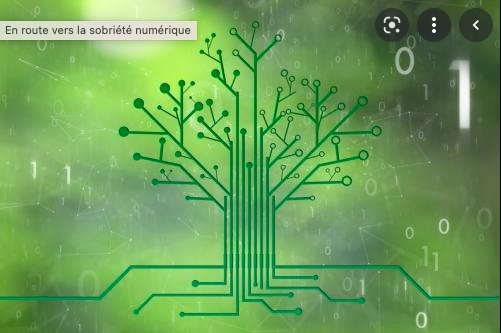The Observatoire des métiers du numérique, de l'ingénierie, du conseil et de l'évènement (OPIIEC) has set out to identify the skills, employment and training needs of companies in the digital sector, in light of their obligations to reduce their environmental footprint.
Companies in the digital and engineering sectors see the ambitions and obligation to reduce their environmental footprint " as simply another technological evolution on top of those they have already overcome... The sector is also used to constant innovation, and therefore considers itself perfectly capable of integrating this new paradigm".
"The environmental criterion is already gaining ground in recruitment, both on the employer's side and the candidate's, particularly among young graduates ", notes OPIEEC. "To date, the training on offer lacks maturity and clarity: it is not yet equipped to meet the challenges of tomorrow, despite the real abundance of solutions available to companies".
New professions ...
"While the ecological transition has not revolutionized core businesses, new areas of expertise seem to be developing in response to the challenges of digital sobriety".
A number of "new" professions are emerging within larger organizations.
- Responsible Digital Manager: he/she provides expertise and acts as an interface between the IT Department, the CSR Department and the General Management. He/she creates value through the responsible design of digital products and services.
- Sustainable Development Director: he/she oversees an organization's sustainable development impacts, activities and aspirations. " The job is becoming increasingly important to companies as they steer strategies linked to sustainable development and sobriety issues in general. These people supervise project managers, heads of responsible departments and work full-time on these issues".
- Carbon auditor: he/she takes "exhaustive photographs" of all the GHG emissions of a particular organization, event or project. He/she facilitates decision-making in terms of actions to be taken to reduce carbon impact.
- Responsible Digital Trainer: provides expertise and support to Green IT managers. He/she is responsible for raising awareness and training internal teams.
"These new professions tend to be reserved for larger companies," says OPIEEC. " In smaller companies, these functions are often integrated into general management, or even technical management".
... and new skills for core businesses
While business function mapping is only slightly affected, "all business functions will have to comply with the requirements to reduce the impact of digital technology: management, sales and marketing functions, technical/product departments, but also all types of other support functions".
The study identifies a series of key skills directly linked to reducing the environmental footprint of digital technology.
- In terms of hardware, this means knowing how to use input peripherals (mouse, trackpad, tablet, microphone, Ethernet cable, etc.), mastering processing peripherals (processor, microprocessor, CPU, motherboard, etc.), storage peripherals, understanding output peripherals (screens, network output devices, different ports, etc.), understanding how to power devices, and mastering man-machine interactions.
- When it comes to software, it's important to master software eco-design via various tools, the user interface (UX Design), automation and the continuous integration environment.
- Finally, when it comes to network and cloud computing, this means mastering architecture in all its forms (functional, solution, application, data, software, integration, technical), mastering cloud computing architectures (private, hybrid, public) and virtualization.
A training offer that is insufficient in number, unclear and, according to the majority of players, ill-adapted.
"Some engineering schools and universities offer modules on the subject ", such as ESAIP in Angers and the University of La Rochelle. " But the subject is unfortunately only touched on in the majority of training courses".
This brief initial training offer does not cover the entire spectrum of the theme.
In particular, OPIEEC points to
- " The absence of a training course totally dedicated to the theme".
- "Training that skims the surface of eco-design (Life Cycle Assessment - LCA) and doesn't go into digital optimization in depth".
- "Business and engineering schools insufficiently involved".
- "Students are sometimes forced to self-train on their own initiative to acquire a base of knowledge".
As far as continuing education is concerned, OPIEEC observes " a profusion of offerings", and even " a Far West effect ", as it is " so difficult to find one's way around". This is due to the multiplicity of players positioning themselves to offer training on this theme: digital service companies (ESN), consultancies, training organizations and associations. Complementary training modules are often " too generic".
An action plan?
The OPIIEC study concludes with an action plan:
- Define and clarify the concept of the digital environmental footprint;
- Raise awareness among all players in the ecosystem;
- Densify and increase the reliability of technical training;
- Adapt the mapping of professions.
Référence :









